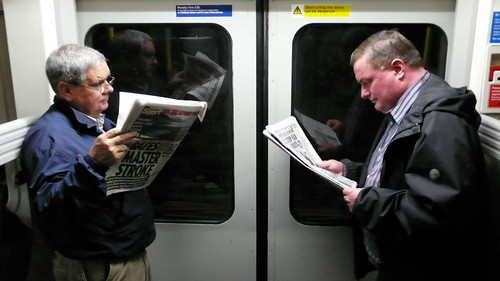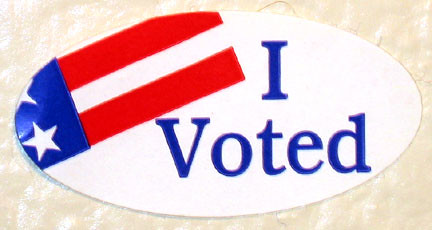This week I want to discuss the way the news on American and Italian elections is presented in the online version of three newspapers from three different countries:
The New York Times (U.S.A)
The Guardian (U.K.)
Il Giornale (Italy)
First of all, I’d like to give a general description of the three journals – political alignment, coverage of political events, location of the news, differences and similarities. Let’s start with the NY Times.
The New York Times is a daily newspaper published in New York City and distributed internationally; it is the largest metropolitan newspaper in the United States. According to a 2007 survey of public perceptions of media, "40% believe the Times has a liberal slant and 11% believe it has a conservative slant” (Wikipedia).
As for the U.S. elections, The NY Times website includes a section ("Politics") where all the articles about the election campaign are published and where the reader can find the link to “The Caucus”, the New York Times Politics Blog, and to another section, “Election Guide 2008”, which provides useful information about the elections in general (primary election results, candidate profiles, campaign finances, primary calendars, map of campaign events, comparison between the candidates about health care, abortion, Iraq, immigration and other issues). All in all, this newspaper offers a lot of information and data about the elections, though many titles regard the Democrats, Obama in particular.
Below there are the links to the most important articles (those in the upper part of the page with the biggest titles) that have been published during these last few days.
For Democrats, Increased Fears of a Long Fight (March 16)
Obama Denounces Statements of His Pastor as ‘Inflammatory’ (March 15)
A Free-Spirited Wanderer Who Set Obama’s Path (March 14)
Democrats Face Racial Issue Again (March 13)
Obama Wins in Mississippi (March 12)
The Guardian is a British newspaper; it’s published from Monday to Saturday. According to a December, 2004 survey, 44% of Guardian readers voted in favour of Labour, 37% for the Liberal Democrats and only 5% for the Conservatives, the lowest percentage of any large British newspaper. The paper's comment and opinion pages are dominated by centre-left writers and academics (Wikipedia).
The online version includes a section, “US Election 2008” (like The NY Times), where the news is presented in reverse chronological order. Like The New York Times, The Guardian gives extensive coverage of Clinton - Obama race, and here again the main focus is on the Senator from Illinois, Barack Obama.
These days, The Guardian has been giving particular attention on the potential damage to Obama's campaign after the sermons by his former pastor, the Rev Jeremiah Wright, who accused the governement of racism and describes black Republicans as sellouts. The Guardian has dedicated three articles – The Times only one – to the question (see the links below) and, for three days, the news Pastor's sermons could hurt Obama has covered the upper-left side of the “US elections 2008” page.
Pastor's hellfire sermons put Obama's campaign in hot water (March 14)
Obama forced to denounce pastor's inflammatory remarks (March 14)
Obama faces potential damage from his pastor's comments (March 13)
Il Giornale is a daily newspaper published in Milan, Italy. I think it’s worth quoting a short history of the paper I found on Wikipedia to better understand the reason why it’s “characterized from its birth by strong opposition to the left-wing parties”.
It was founded in 1974 by Indro Montanelli, who did not support the new progressive line adopted by Corriere della Sera, where he was one of the historic names. In 1977 Montanelli, in economical difficulties, accepted a financing offer by Silvio Berlusconi, who thus became the newspaper publisher. Indro Montanelli edited and directed il Giornale from its creation, until Berlusconi entered politics (December 1993). At that time he decided to found the new daily La Voce. In 1994, Berlusconi sold il Giornale to his brother Paolo and Vittorio Feltri replaced Indro Montanelli in the newspaper editorship (Wikipedia).
As far as the Italian general elections are concerned, I’ve noticed that Il Giornale often speaks about Silvio Berlusconi and carefully reports all the events that concern the leader of PdL. In other words, the viewpoint expressed in the articles is nearly always that of the right-wing candidate, mainly because they’re full of quotes from his speeches. When you read the articles is more or less the same as listening to Berlusconi’s speeches, such as when he attacks the left candidate, Walter Veltroni, or denigrates what the previous left government did.
On average, articles on Berlusconi are published daily and cover at least two pages:
Berlusconi: brogli, rischio grandissimo. Fisco, introdurremo il quoziente familiare (March 16)
Crescita, Berlusconi:"La crisi Usa mette a rischio il Paese" (March 15)
Berlusconi: "Convinceremo gli indecisi". Dal Ppe polemiche su Ciarrapico (March 14)
Berlusconi: antifascista la nostra identità. Politiche, ecco tutti i candidati del Pdl (March 13)
It’s significant that from Thursday March 13 up to now, only one article has been published on Veltroni, and it’s only one page long. In addition, the articles on Berlusconi are posted in the central part of the home page, at the top, so that they have a privileged position on the page. The titles are always followed by big pictures of the “Cavaliere”, who is often portrayed with a very sparkling and self-confident expression, such as here or here .
Unlike The New York Times and The Guardian, Il Giornale doesn’t have a section entirely dedicated to the elections in Italy – polls, campaign events, descriptions of the platforms –, and all the news about Italian politics are published under the “Prima pagina” section.
Do The Times and The Guardian follow the news about Italy’s general elections?
The Times doesn’t follow Italian politics a lot, and (when it does) the accent is on the elections in general, except for one article on Berlusconi: Berlusconi’s Long Shadow Casts a Chill Over Italian Politics (February 2). In fact, it only reported the major political events that happened in Italy in February, after the crisis of Prodi’s government (see the links below), and in these first two weeks of March no articles have been published on Italian general elections.
Italy: Rome Mayor Resigns To Take On Berlusconi (February 14)
With Flawed System Unchanged, Italy Sets Elections for April (February 7)
Mired in Crisis, Italy Veers Toward Elections (February 5)
The Guardian seems to be more interested in Berlusconi's candidancy rather than in the election developments, as can be seen in the links below. King of the gaffe charms Italy again (March 16)
Berlusconi poised for comeback in general election (February 6)
However, the accent on Italian politics reached its peak in February, when Italy announced the snap general election.
Italy announces election date (February 6)
Italy heads for general election (February 5)
Does Il Giornale follow the news about U.S. elections?
This paper is mostly concerned with the Italian campaign; a few events about US elections are reported under “Esteri”. One article about US campaign was published last week, on March 13 (Usa, razzismo nelle urne. Tra i democratici è rissa); however, I found several articles dated from March 9 backwards. As can be seen from the links below, Il Giornale updates its readers on the American elections every two or three days, and stress is put on the Democratic candidates.
Usa, Obama vince nel Wyoming (March 9)
«Hillary è un mostro»: si dimette la principale consigliera di Obama (March 8)
Tra i litiganti Obama e Clinton il repubblicano McCain gode (March 5)
Obama in turbante: la foto-scandalo in rete (February 25)
Primarie Usa: Obama e Hillary divisi su Cuba (February 22)
Primarie Usa, i superdelegati lasciano Hillary per Obama (February 15)
I super-delegati gelano Hillary «Potremmo seguire Obama» (February 13)
Now, let’s compare how the three newspapers dealt with the Ferraro case!
An event which caught the attention of all the three newspapers is the resignation of Geraldine A. Ferraro, former vice-presidential nominee, from Hillary Clinton’s campaign finance committee. Ferraro made no apologies for citing Senator Barack Obama’s race as the decisive factor in his success, i.e. for stating that Obama could not claim the Democratic nomination if he were white or a woman (“If Obama was a white man, he would not be in this position. And if he was a woman of any color, he would not be in this position. He happens to be very lucky to be who he is. And the country is caught up in the concept.”). After being accused of racism, she wrote a letter to the former first lady saying that she stepped down from the fundraising committee because the Obama campaign had misrepresented her remarks to deliberately hurt Mrs. Clinton: “The Obama campaign is attacking me to hurt you. I won’t let that happen.” To be more precise, she accused Obama’s senior adviser, David Axelrod, of “using race as a tactical weapon and of implying that her remarks were racist”. Clinton said she disagreed with Ferraro’s statements, and Obama defined her comment as “divisive”.
By comparing the three articles, I realized that The New York Times (Ferraro Is Unapologetic for Remarks and Ends Her Role in Clinton Campaign) and The Guardian (Ferraro steps down from Clinton campaign role) are more factual and unbiased, though the former is more detailed than the latter. The article on Il Giornale (Usa, razzismo nelle urne. Tra i democratici è rissa), instead, is less factual containing very few facts and a lot of comments and opinions by the writer: “Doveva succedere: bianco-nero, il razzismo, la segregazione. La minoranza afroamericana e la maggioranza bianca. […] : la questione razziale entra di colpo nella campagna elettorale delle primarie. […] E non si sa se sia stata una gaffe o una scelta precisa per togliere lo sguardo dallo scandalo di Eliot Spitzer”, “C’è un mondo che ruota attorno al sentimento di rivincita che monta nell’ambiente nero”, “Con Obama potenziale candidato presidente e primo afroamericano della storia che può davvero arrivare alla nomination, è tornato l’orgoglio black”, etc.






